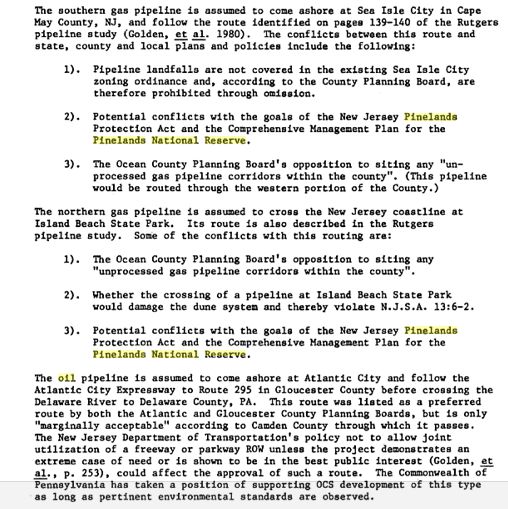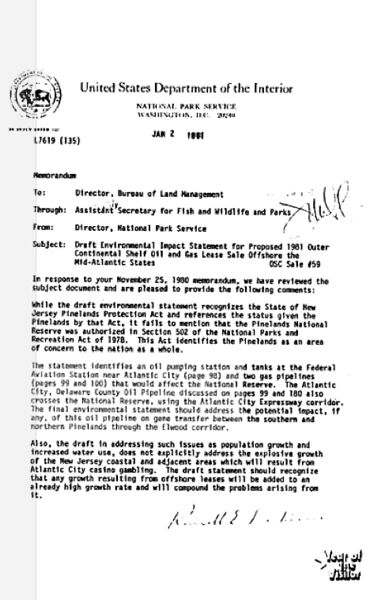Untold Pinelands History
One Reason The Pinelands Were Created Was To Block Oil & Gas Pipelines
Current Commission Betrays Legacy
National Parks Service Raised Concerns With Pipelines and CMP
Ocean and Cape May Counties Fought To Block Pipelines
Twice in the last few years, initially at a Princeton event honoring former Governor Byrne, and more recently at a Trenton press conference, I heard former Governor Florio emphasize an important aspect of the history of the creation of the Pinelands that is not widely known.
The Pinelands National Reserve was created by Congress in 1978 by Section 502 of the National Parks Conservation and Recreation Act. Then south Jersey Congressman Florio was a sponsor of the Act, which created the nation’s first National Reserve, authorized the first Comprehensive Management Plan (CMP), and led to passage of the NJ State law known as the Pinelands Protection Act. The first CMP was adopted before the NJ State law was signed by Gov. Byrne.
The little known historical aspect Florio emphasized was that NJ leaders supported creation of the Pinelands, in part, due to strong public opposition to off shore oil and gas leases and off shore drilling, and plans to run pipelines through the Pinelands. Protection of the Pines could serve to block those pipelines from east to west.
At the Princeton event, Florio noted:
Governor Florio (who served in Congress from 1975 – 1990) shared his national perspective, noting that the Carter Administration and many in Congress – just like today – were concerned about the Nixon Administration’s energy policy, impacts of off shore drilling, and plans to run pipelines across the Pines to refineries along the Delaware River. This prompted Congress in 1978 to create the nation’s first National Reserve in the Pinelands.
I was intrigued by that huge historical irony created by current proposals to run gas pipelines through the Pinelands, so I did a little research to learn more.
Curiously, I could not find the oil & gas drilling and pipeline justification for creation of the Pinelands anywhere in the official Pinelands histories published by the Pinelands Commission, or the National Parks Service, or by the Pinelands Preservation Alliance. Although I found several excellent analyses of the Pinelands as a regional planning and management model, I could not find it in the academic or planning history literature either. Not one paper mentioned opposition to off shore drilling or pipelines.
Finally I did find an Environmental Impact Statement on the off shore oil and gas leasing program that showed 3 pipelines (2 gas, 1 oil) crossing the Pinelands.
I was surprised to learn, confirming Florio’s observations about strong opposition, that Ocean and Cape May Counties had policies that opposed and sought to block pipelines.
As I was telling this story to the Pinelands Commission yesterday, and contrasting it to today’s cheerleading for pipelines and rubber stamp environmental approvals, Commissioner Avery interrupted and disputed my testimony regarding the policy of the Ocean County Planning Board.
Avery claimed he was on the Planning Board at the time and that I was wrong.
But an excerpt from page 202 of the DEIS on off shore oil and gas leases (see point #3 below) proves Avery doesn’t know his own history.
The Ocean County Planning Baord policy was “opposition to siting any unprocessed gas pipeline corridors within the county”. Cape May County took the position that pipelines were “prohibited through omission”.
I was also able to find an excellent historical Report – which confirms Florio’s observations – that traces how the State’s organized opposition to the federal leasing program, by the Delaware State Geologist, see:
And the National Parks Service submitted comments on the DEIS to note that pipelines would conflict with the Pinelands CMP. See this January 2, 1981 NPS letter:
Does the oil and gas industry have such power that they can expunge this strong opposition from the historical record?
This history shows how far public officials have sold out to the fossil industry.
Public opposition has remained strong, while government officials have walked away from a legacy of working to protect the environment from oil and gas development – and all that was BEFORE the science of climate change was widely understood.

